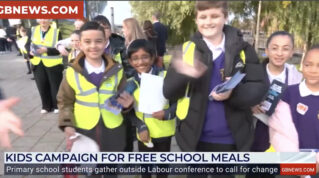Children “don’t deserve” the disruption of strike action, the education secretary has said, as she vowed to ensure “as many schools are open for as many children as possible” when teachers walk out next month.
The National Education Union announced yesterday that it had met the legal threshold for strike action by teachers in England.
Turnout in the ballot was just over 53 per cent, and more than 90 per cent of those who voted supported strikes. Seven days of action are planned in February and March.
Gillian Keegan told Sky News this morning that the outcome of the ballot was “deeply disappointing”.
“I am very disappointed in the one union that has decided to go on strike. Our children don’t deserve it to be honest. We do need to keep teachers and children in school.”
The government has updated its guidance for schools, advising them to prioritise certain groups of children, such as vulnerable pupils, if they need to restrict attendance, and to provide remote education.
Keegan told Good Morning Britain she “can’t guarantee” all schools will stay open.
“But we’ll be working with headteachers to make sure as many schools are open for as many children as possible”.
The NEU is the only union to have passed the turnout threshold for strike action in England, though NASUWT has said it will re-ballot members, and the NAHT leaders’ union is considering doing the same.
‘You don’t need to strike to get my attention’
Keegan has been criticised for failing to act to avoid strikes, only holding crunch talks with union bosses last week despite being appointed in October, and the dispute having gone on for months.
But the minister claimed this morning that unions “don’t need to strike to get my attention”, and said she would meet with leaders tomorrow.
“I will meet with people, I’ll be as constructive as possible, but we do need to be fair, and the number one thing we need to do is tackle inflation.”
Keegan was also criticised by unions last week after talks focused on next year’s pay award, despite the current dispute being about this year, when most teachers and leaders were offered 5 per cent.
Pressed on the talks, Keegan insisted that pay was discussed, but acknowledged “we talked about mostly in relation to the pay review body of next year”.
“What is happening at the moment is the submissions that we all put in…we’ve got to have that in by January 27. So that’s what we’re all working on, to make sure that we can see if we can try and come closer together when we look at pay for the next pay review body.”
Teaching ‘still attractive’, Keegan claims
Unions have warned that below-inflation pay rises, which mean experienced teachers’ pay is 13 per cent lower in real-terms than it was in 2010, are contributing to a growing recruitment and retention crisis.
Last year the government missed its secondary trainee recruitment target for the ninth time in a decade, and also recruited fewer primary trainees than needed.
Keegan told LBC this morning that teaching was “still an attractive profession”, and claimed the government was “pretty much meeting our recruitment targets” before the pandemic, except in maths and computer science.
But the data tells a different story. In pre-pandemic 2019, the government missed its secondary recruitment target by 15 per cent, and its primary target by 4 per cent. Recruitment was also well below target in physics, languages and chemistry, not just maths and computing.
Keegan also told Sky she wanted to focus on things other than pay.
“Actually the number one reason teachers leave…is workload. And flexibility. They want more flexibility, job shares, being able to work part-time, that kind of thing. They’re the things that we really need to focus on.”
Strike law could focus on vulnerable children
Keegan also indicated today that new anti-strike legislation could be used in future to ensure schools stay open to vulnerable pupils during action, but said she hoped not to use it on schools.
The draft law to give the government the power to set “minimum service levels” to be provided during strikes in sectors such as education and health passed its second reading in Parliament.
The government has said it will not initially consult on minimum service levels in education, but will retain the right to do so in case unions don’t agree to provide them.
Keegan told LBC: “All we’re trying to do there is to make sure that we have the minimum service safety levels in place. It’s going to initially focus on health and rail, and education is in there, but we’re hoping not to use it in education, because at the moment we’re not at that stage.
“We want to make sure, for example, we need to keep schools open for vulnerable children in particular, that’s something we very much learned during the pandemic. So yes, we are part of the bill but at the moment the focus initially will be on health and rail, and then when we get to that stage we will consider what is reasonable then.”
















Your thoughts